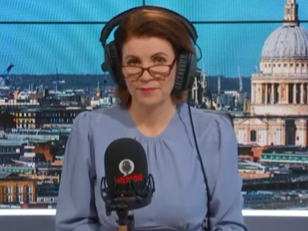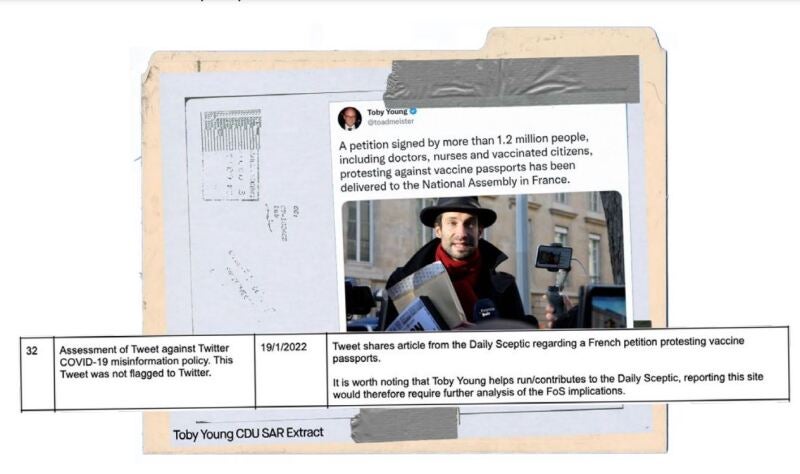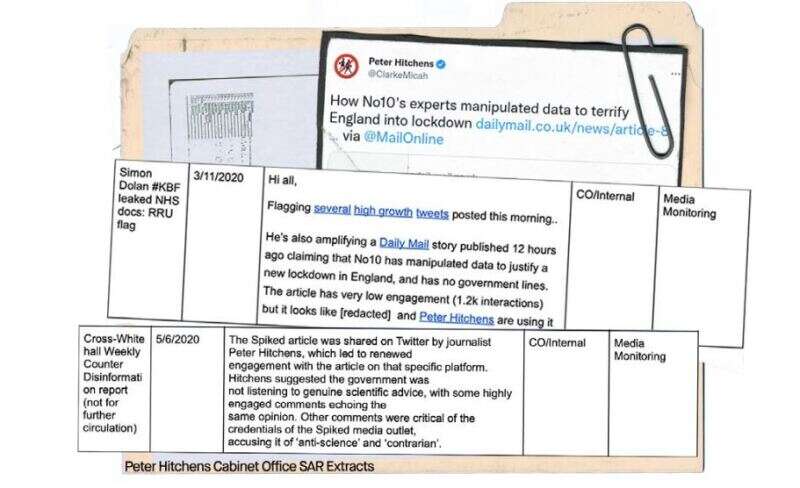
Journalists who expressed criticism of measures to tackle the Covid-19 pandemic were monitored by Government units, according to a new report.
The action was taken by Government units set up to tackle disinformation, according to the report from privacy campaigning organisation Big Brother Watch. These include the Counter-Disinformation Unit (CDU) within the Department for Digital, Culture, Media and Sport, the Rapid Response Unit (RRU) based in the Cabinet Office which was set up in 2018, and the Army’s 77th Brigade.
Among the report’s findings, made using a series of freedom of information and subject access requests, were that the DCMS unit claimed a Talkradio clip of an interview about vaccine passports may have breached Twitter’s Covid-19 misinformation policies and that it debated whether to report three posts by Spectator associate editor Toby Young to the platform.
Staff were warned that reporting the journalist, who had posted links to articles on his site the Daily Sceptic, would “require further analysis of the FoS [freedom of speech] implications” and Young was not ultimately flagged.
The Big Brother Watch report said: “It is worrying that government officials were considering to recommend that a foreign Big Tech giant censored a British journalist, only opting not to on account of the individual’s profile.”
The human rights group also raised concerns that in one of the three posts, pictured below, Young was sharing factual information about the scale of objections to vaccine passports in France. “There is no interpretation either by the state or by Twitter that should view this as false; it simply reflected opposition to a government policy direction, yet was actively considered as a case of misinformation.
“This suggests that either certain people, such as Mr Young, were subjected to specific scrutiny for their tweets around the coronavirus or the dis/misinformation net was cast so wide by the CDU that vast amounts of legitimate, lawful speech was caught up in it.”

Society of Editors executive director Dawn Alford said in response to the report: “At a time when many journalists put themselves at risk to provide the public with accurate and timely news, analysis and information during the Covid-19 pandemic, it is deeply concerning to hear reports that a number of reporters were put under surveillance for questioning government policies at a time when unprecedented restrictions were placed upon civil liberties.
“Journalists were critical to public safety and understanding of Covid-19 during the pandemic and, as part of their role, there was legitimate public interest in them scrutinising the decision-making of officials.
“The Society will be seeking urgent confirmation from the Government as to the specific remits of its disinformation units moving forward alongside assurances that public money is not being misused on recording government-critical reports.”
The Counter-Disinformation Unit within the DCMS was ramped up in March 2020 to tackle fake news about Covid-19 that was being spread online, having previously looked at narratives around the European Parliament and UK general election in 2019.
During the pandemic, the unit created reports about certain topics and circulated them to other government departments. One report entitled “CDU Vaccine Mis/disinformation: Narratives and Engagement” featured news articles about vaccines, for example, one described as having “low engagement” from the Daily Mail about the introduction of compulsory booster jabs for care home staff and foreign travel. It included examples of how named people were sharing the links online, alongside comments about their perceived attitudes to vaccines.
Also highlighted in a CDU report, created by AI-based internet monitoring firm Logically for the unit, was a Telegraph article co-authored by Conservative MP David Davis in May 2020 headlined: “Is the chilling truth that the decision to impose lockdown was based on crude mathematical guesswork?” Davis was described in a report as “critical of the Government”.
Another DCMS-commissioned Logically report on “Covid-19 Mis/Disinformation Platform Terms of Service” repeatedly featured Hartley-Brewer. Initial subject access requests showed only that she was featured in “reports on online activity” before more information was provided.
Among her lockdown-sceptical tweets reported to the Government was one in January 2021 sharing a clip from her Talkradio show alongside which she wrote: “Another personal experience of the damage lockdown causes from a @talkRADIO listener. Her fiancé’s business is closed down, her father’s cancer treatment cancelled and her grandma is scared to even leave her home. This lockdown is a national tragedy way beyond Covid deaths.”
Another, in February 2021, was a quote tweet from a Government Covid press conference in which she wrote: “So the education, physical and mental health of millions of children are being sacrificed at the altar of the slogan “Protect The NHS”. I thought the NHS was supposed to protect us, not the other way round. If the NHS can’t cope, after 10 months to prepare, why not?”
In the same report, a clip of an interview Hartley-Brewer conducted on her Talkradio show with Big Brother Watch director Silkie Carlo about vaccine passports was flagged, apparently to suggest it may have breached Twitter’s terms of service although it is not clear how.
The Big Brother Watch report accused the CDU of “mission creep” in its activities, saying: “These reports raise questions about the CDU’s remit, as the routine monitoring of mainstream media outlets and their article’s social media reach is a long way from battling propaganda from hostile entities.
“With live topics and fast-moving debates, it is incumbent on the state to refrain from overzealously labelling outlets and views as fake news and disinformation given the risk that legitimate minority views could be hit with these labels and consequentially censored.” The report also suggested that special attention was paid to the website of Russia state-backed RT.
The Cabinet Office’s Rapid Response Unit was launched in 2018 under Theresa May’s Government, in part targeting “alternative” news sources and “sensationalist” stories using its team of analysts, data scientists and media and digital experts. They monitored news as it was being shared around the clock to decide how to tackle “stories of concern” in order to reclaim a “fact-based public debate”.
In 2020 its remit around the pandemic focused on “tackling a range of harmful narratives online… from purported ‘experts’ issuing dangerous misinformation to criminal fraudsters running phishing scams”. The unit has since been disbanded.
Mail on Sunday journalist Peter Hitchens was flagged by the RRU in November 2020 when he shared a Daily Mail article based on leaked NHS documents claiming the data given to justify that month’s lockdown was incomplete.
RRU staff accused Hitchens in an internal email of using the article to “further their anti-lockdown agenda and influence the Commons vote [to approve the lockdown] tomorrow”. He was also flagged for sharing a Spiked article, raising its engagement, in a weekly counter-disinformation report to Whitehall.

The Big Brother Watch report said: “…Mr Hitchens’s tweet simply shared an article from his employer’s sister paper, without offering comment on the contents. It is worrying that a journalist’s post, which had fairly low engagement, was monitored by the RRU simply because it linked to an article that criticised government policy.
“It is even more concerning that the monitoring appeared to take issue with information being shared that might influence a vote in parliament. The very purpose of journalism is to inform the population and, as such, benefit democracy.”
Also flagged by the RRU was a Daily Mail/Mail Online article by journalist Ross Clark, which was widely shared by high-profile lockdown sceptics. Officials suggested press officers should get in touch with the Mail to “make them aware of the public health impact”, in other words, the public potentially not complying with the lockdown, although there were seemingly no inaccuracies or elements of disinformation in the article.
The Department of Health eventually shared its own rebuttal tweet claiming the article was “misleading” but the newspaper asked for this to be removed for “relationship management” reasons, a request that was met.
Separately, in an October 2021 report, Hartley-Brewer was labelled among “vaccine sceptics” for disagreeing with cabinet ministers even though she publicly stated she had two doses of the vaccine. Young was similarly mentioned in a “vaccine hesitancy” report for disagreeing with government policy.
The British Army’s 77th Brigade describes itself as meeting the challenges of “modern warfare” by monitoring and disseminating media material online. This unit was accused of collating tweets by people who expressed dissatisfaction with Covid-19 policy and passing them to the Cabinet Office.
A Government spokesperson said: “Online disinformation is a serious threat to the UK, which is why during the pandemic we brought together expertise from across government to monitor disinformation about Covid.
“These units used publicly available data, including material shared on social media platforms, to assess UK disinformation trends and narratives.
“They did not target individuals or take any action that could impact anyone’s ability to discuss and debate issues freely.”
Email pged@pressgazette.co.uk to point out mistakes, provide story tips or send in a letter for publication on our "Letters Page" blog
